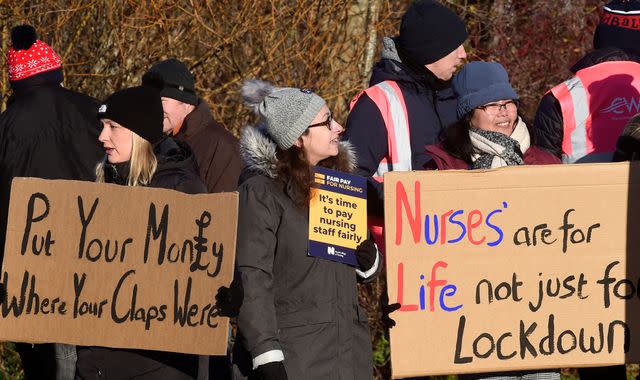NHS strikes in Scotland on hold after 'breakthrough' in talks with government

The threat of widespread strikes across Scotland's NHS has been put on hold by unions after "constructive" talks with the government.
The GMB, the Royal College of Nursing (RCN) and the Royal College of Midwives (RCM) will hold-off on walkouts while entering an "intensive period of negotiations" on the 2023 pay deal.
Health secretary Humza Yousaf hailed the "breakthrough" and called on his counterparts in Westminster to follow Scotland's example to prevent further strikes south of the border.
The unions in Scotland had been due to announce strike dates and still have a mandate to do so if negotiations aren't successful.
The latest union move follows meetings with the Scottish government which "produced new proposals aimed at ending the long-running pay dispute" affecting staff in the NHS and ambulance service, GMB's Scotland organiser Keir Greenaway said.
This includes a commitment to backdate the value of any agreed terms for 2023-24 to 1 January and start negotiations next week.
Mr Greenaway said: "After meetings today with our workplace representatives, and after extensive talks yesterday with the cabinet secretary and our sister unions with strike mandates, GMB is prepared to engage in good faith with the Scottish government on fresh proposals to resolve this dispute.
"We welcome the cabinet secretary's invitation to start these negotiations from next week, along with his commitment to effectively backdating the value of any agreed terms for 2023-24 to 1 January, and the protection of our members' strike mandates for a further three months."
The unions previously rejected an offer of a 7.5% rise for most members, though it was accepted by others including Unison and Unite.
If you are an NHS worker and would like to share your experiences with us anonymously, please email NHSstories@sky.uk
Mr Greenaway warned the new offer would need to exceed last year's one and be implemented by April to avoid strikes further down the road.
While the threat of action is not over entirely, the possibility has been greatly reduced.
Unions 'cautiously optimistic'
The Royal College of Midwives (RCM) said it is "cautiously optimistic" over a pay deal with the Scottish government following the breakthrough.
Jaki Lambert, director of Scotland at the RCM, she was "hopeful that this is a turning point in the dispute".
RCN director Pat Cullen, who met Nicola Sturgeon on Friday, thanked the Scottish government for showing "a willingness to return to the negotiating table and to act to address the nursing workforce crisis".
She added: "The first minister is in no doubt that we will take strike action if the proposals being outlined do not deliver a significant improvement by the end of February."
The breakthrough is likely to put pressure on Prime Minister Rishi Sunak, who has been accused of "demonising ambulance workers" in order to justify new anti-strike legislation.
The UK government is refusing to negotiate with unions on pay - with nurses due to strike for two days next week and another ambulance strike scheduled for the week after.
Mr Yousaf urged Downing Street to follow in Scotland's example.
He said in Scotland a "positive way forward has only been possible due to both sides willingness to engage and where necessary compromise".
"None of us want to see industrial action, and all of us do want to see our NHS staff fairly rewarded. In that spirit we will get 23/24 talks under way without delay."
He also hit out at the anti-strike legislation, which will require minimum levels of service in key sectors during industrial action, preventing some union members from being able to join the walkouts.
Read More:
When have industries previously gone on strike and what has it achieved?
GMB union to consider up to six more ambulance strike dates after failed talks with health secretary
He said his government's approach "is in stark contrast to the UK government who this week introduced draconian anti-trade union legislation, which we strongly oppose".
"I would urge the UK government to follow Scotland's example and engage in meaningful dialogue with trade unions, and offer them a fair pay deal."
Speaking earlier on Friday, Mr Sunak said he hopes to "find a way through" the deadlock with unions to avert further walkouts.
"Look, I think with strikes it's important that we remain in strong dialogue with the unions, that's why the government invited all union leaders in to have those discussions," he told broadcasters during a trip to Scotland.
"The discussions are ongoing and hopefully we can find a way through."

 Yahoo News
Yahoo News 
